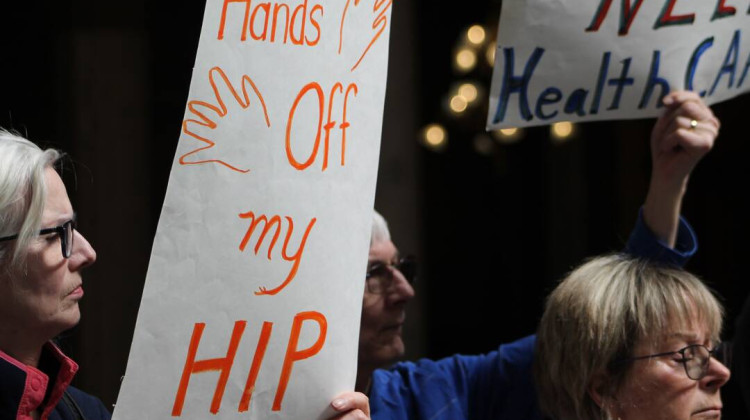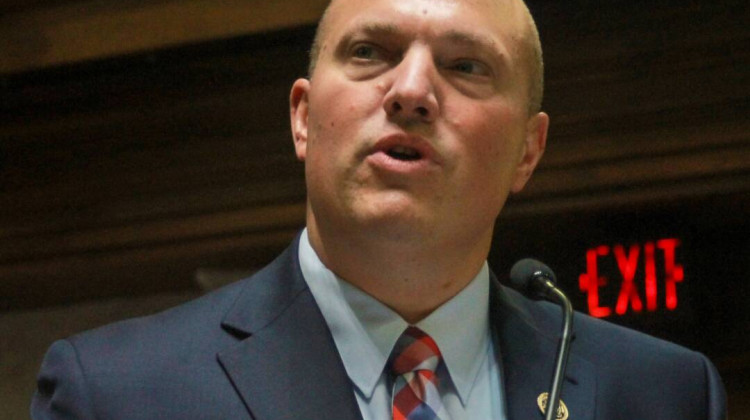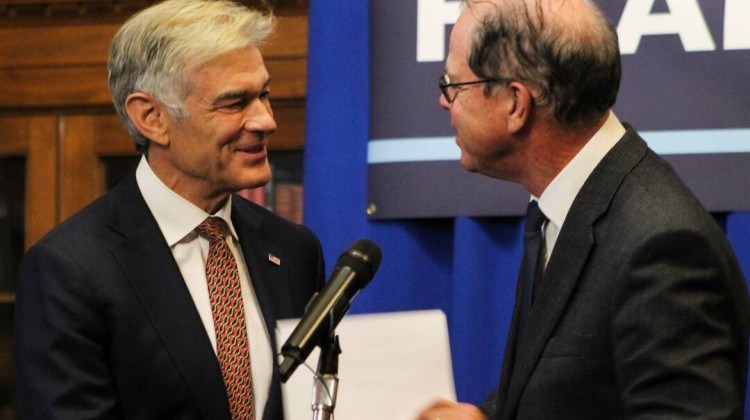
At a time when they need her the most, Teshezia George says she is forced to shutter her shelter doors to women without a safe home.
Hilary Powell/Side Effects Public MediaAt a time when they need her the most, Teshezia George says she’s forced to shutter her shelter doors. That leaves women who have fled domestic violence to sleep in unsafe spaces.
“A lot of times I'm getting off the phone feeling just terrible,” she said, “Because I know these people are going to sleep in their car again or in an abandoned house.”
George, a shelter executive director, said her 14-unit Rainbow-Ark Shelter in Gary is not open to clients while undergoing much-needed renovations. Normally, the shelter invites women and children affected by homelessness, domestic violence or sexual assault to stay for about two months.
Now, it’s just George working solo, stocking shelves and taking on a variety of tasks since social distancing measures have forced her staff to telecommute.
“I think the staff stress level is at an all-time high,” she said. “Everybody's worried.”
Meanshile calls for support have not slowed down. In fact, the shelter’s crisis line has seen a 50 percent uptick in calls over the past few months, George said.
In Indiana, domestic violence calls and domestic violence deaths are on the rise. Advocates say the increase is directly related to coronavirus. The Indiana Coalition Against Domestic Violence reports an 86 percent increase in domestic violence-related deaths.
Whitney Guthrie leads a team of 12 bilingual advocates for Families First Indiana, an agency that serves survivors of intimate partner violence and sexual assault. She said the economic uncertainty of the coronavirus pandemic adds stress to relationships where abuse is already occurring.
“If the whole world feels unsafe and your own home is the most dangerous place that you have, you're stuck,” Guthrie said. “What are your options? The need only increased, but the resources significantly decreased.”
Safety and support
Now, the Domestic Violence Network and Families First Indiana are partnering to provide free, extended-stay hotel rooms to those who are escaping a violent situation and need more space to quarantine. Families First is also providing virtual support groups for those who have experienced domestic violence, sexual assault and child abuse.
Guthrie says the clients she works with who are currently housed at hotels get a grocery stipend to nearby stores and access to WiFi for work and distance learning.
“[They need] to have that idea of being a safe location where my abusive partner doesn't know that location,” she said.
Guthrie said it’s important to address misconceptions about how hard it may be for a survivor to leave an abusive relationship, especially during a pandemic that encourages people to isolate.
If you or someone you know is experiencing abuse, call the National Domestic Violence Hotline at 1−800−799−7233 or text LOVEIS to 22522.
“When the only thing people have to say about [abuse victims] is ‘they should just leave,’” she said, “That is the least helpful thing that we can say, especially during COVID-19. How am I going to leave if I can't go to my grandmother's house? I can't bring my children into that home and make her positively exposed to coronavirus, and I can't call people and say that I need help because my partner is always around.”
Reaching teens
In an effort to reach families who may still be social distancing, the Domestic Violence Network is partnering with Indianapolis Public Schools to launch a new billboard and poster campaign this month to educate youth about teen dating violence.
The Centers for Disease Control and Prevention reports Indiana ranks third-highest in the nation for the percentage of high school students who reported sexual dating violence.
For more information on the IPS Title IX policy and teen dating violence resources, visit: myips.org/teendating
The campaign puts resources on half a dozen outdoor billboards near IPS high schools, a dozen IndyGo bus ads and on posters to help students understand the signs of teen dating violence and where they can go for help.
The need to distance is forcing all advocates to get creative in their caring.
George is prepping to reopen the shelter at the beginning of 2021 but says she’s unsure of how the shelter will provide the intimate services she’s used to while adhering to social distancing guidelines.
“We provide a lot of hands-on communication with clients from the moment they walk in the door because sometimes they’re coming from a traumatic situation,” she said. “We sit with them for hours just to get them comfortable."
George is seeking financial donations to pay for the new personal protective equipment she’ll have to give the families who sometimes show up without face masks and other safeguards.
“When they call, I am honest to let them know we are closed,” she said, “But I do not get off the phone until I try to find a resolution for them. It is [heartbreaking].”
This story was produced by Side Effects Public Media, a news collaborative covering public health.
This story was reported as part of a partnership between WFYI, Side Effects Public Media and the Indianapolis Recorder.
 DONATE
DONATE






 Support WFYI. We can't do it without you.
Support WFYI. We can't do it without you.